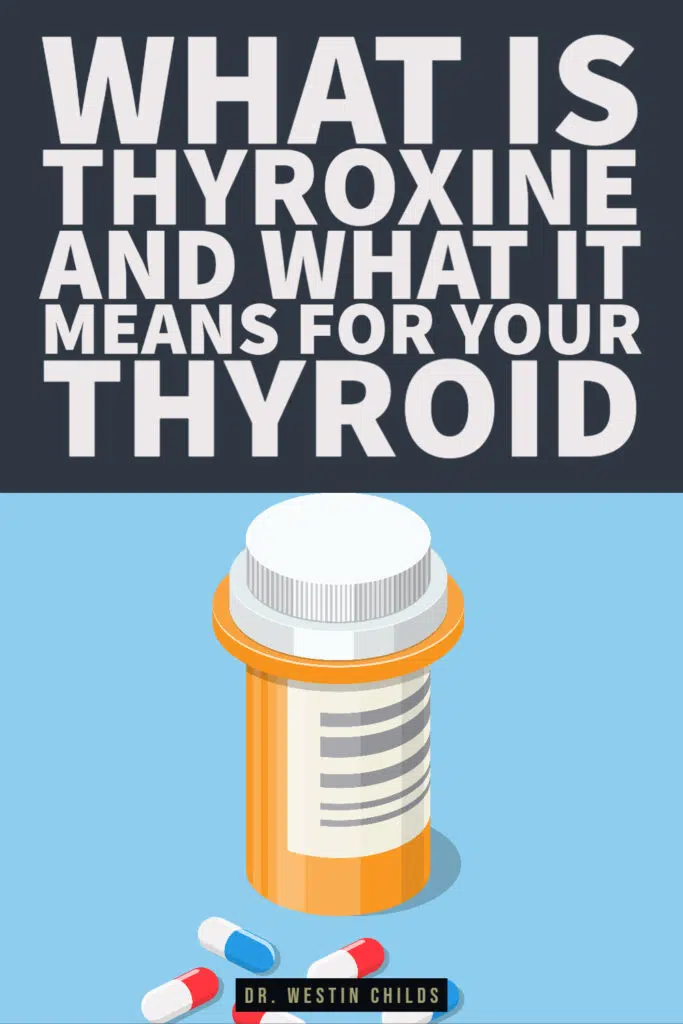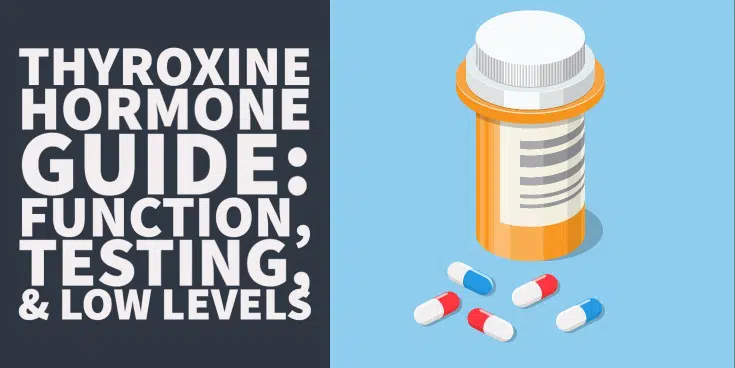Thyroxine is a major player in thyroid hormone balance in your body.
But, why if this hormone is so important, do most physicians ignore this test (or simply fail to order it)?
Why do physicians focus solely on the TSH instead of free thyroid hormones?
Learn more about Thyroxine including how to test for deficiency, the importance of this hormone as it relates to thyroid conversion, how to supplement with medications if your levels are low, and the side effects associated with its use:
What is Thyroxine? (Functions & How it Works)
Thyroxine is the full and scientific name given to one of the major thyroid hormones produced from your thyroid gland.
You might know Thyroxine as its more common name T4, either way, both names refer to the same biological hormone.
But what does T4 do in the body?
T4 is produced in large amounts from your thyroid gland in response to the stimulating hormone TSH.
TSH, produced by the pituitary, acts on thyroid gland tissue which triggers the release of thyroid hormones into your bloodstream.
80% of thyroid hormone produced from your thyroid gland is in the T4 form (1).
Thyroxine (T4) then circulates through your body where it is converted to T3 where it then acts on your cells.
Thyroxine is incredibly important because, without it, your body would not be able to create T3.
While Thyroxine is not the most biologically active thyroid hormone, it still plays a very important role in acting as a reservoir for thyroid conversion.
The most potent and biologically active thyroid hormone is T3 or Triiodothyronine, but the trick here is that most of the T3 in your body STEMS from T4.
The process by which T3 is created from T4 is known as thyroid conversion (2).
In this way, your body plays a balancing act with both T3 and T4 levels.
It’s hard to say that one is more important than the other, but for now, just realize that both hormones are necessary and required for optimal thyroid function in your body.
Thyroxine, after being converted to T3, then acts on nuclear receptors in your cells to alter genetic transcription (3) (to change your genes).
This is how your thyroid gland works!
Deficiency in Thyroxine may result in symptoms that range from fatigue to weight gain to depression and so on.
DOWNLOAD FREE RESOURCES
Foods to Avoid if you Have Thyroid Problems:
I’ve found that these 10 foods cause the most problems for thyroid patients. Learn which foods you should avoid if you have thyroid disease of any type.
The Complete List of Thyroid Lab tests:
The list includes optimal ranges, normal ranges, and the complete list of tests you need to diagnose and manage thyroid disease correctly!
Symptoms of Thyroxine Deficiency (Hypothyroidism)
Can you get a deficiency of Thyroxine?
The short answer is YES, the long answer is more complicated.
The condition in which the body is deficient in Thyroxine is referred to as Hypothyroidism.
The truth is that most conditions that cause hypothyroidism tend to cause both a deficiency in Thyroxine AND Triiodothyronine (Both T4 and T3).
Generally, a deficiency in thyroid hormone is the result of damage directly to your thyroid gland.
Remember that your thyroid gland PRODUCES thyroid hormone, so in order for you to have sufficient thyroxine in your body, it must be produced from your thyroid gland.
When damaged your thyroid gland will be LESS responsive to TSH.
This results in a RISE in serum TSH levels which is an indication of hypothyroidism.
You can check the TSH, along with both T4 and T3 levels, to help diagnose the condition.
Those with hypothyroidism and thyroxine deficiency often present with very characteristic symptoms.
I’ve included a list of the most common symptoms below:
- Weight gain (usually mild)
- Fatigue
- Hair loss
- Dry skin
- Muscular pain
- Menstrual problems
- Infertility
- Depression
- Constipation
Low thyroid hormone can cause MANY other issues (beyond the list above) because almost every cell in your body has a thyroid receptor.
You can learn more about the symptoms associated with low Thyroxine levels here.
Using Thyroxine Medication (Levothyroxine, Synthroid & Tirosint)
Don’t let this confuse you, but Thyroxine is ALSO the name of the medication that is used to treat thyroxine deficiency (hypothyroidism).
And this makes perfect sense if you think about it:
If you are deficient in Thyroxine hormone then wouldn’t you want to replace that lost or deficient hormone with the exact same hormone in your medication?
The answer is obviously yes, but this way of thinking isn’t always common in hormone replacement therapy.
Take for instance female sex hormones:
When women have problems with estrogen or progesterone they often take medications such as birth control pills which are NOT the exact same as the estrogen that the body produces naturally (4).
But in the case of Thyroxine replacement, we are using the exact same thyroid hormone that your body is deficient in.
This is known as using bio-identical hormones (5) and Thyroxine falls into this category (which is good).
Thyroxine is the ACTIVE ingredient in many medications used to treat hypothyroidism.
Medications that contain Thyroxine include Synthroid, levothyroxine, Tirosint, and Levoxyl.
Thyroxine is also present in T3/T4 combination medications such as Natural Desiccated Thyroid hormone.
If you have a diagnosis of hypothyroidism, and you are taking thyroid medication, there is a good chance you are already taking Thyroxine.
Testing for Thyroxine & Triiodothyronine (Lab Tests)
Can you test for Thyroxine levels in your body?
Yes, and you absolutely should if you suspect you have a problem or a deficiency.
Thyroxine should ALWAYS be assessed with two other important thyroid lab tests.
These lab tests include T3 and the TSH.
So how do you test for Thyroxine?
The best way is to order a test known as Free T4 or Thyroxine, Free (depending on which lab you use).

This lab test will give you the amount of Thyroxine that is FREE and ACTIVE in your serum.
This is important because most hormones circulate in your bloodstream BOUND to proteins which act as carriers for the hormones (6).
The reason for this is simple:
Hormones are incredibly powerful and we don’t want your body to use them unless they are in the RIGHT place.
So your body has created a mechanism to bind proteins and inactivate them until they have hit the right place.
We can check for the number of bound hormones in the bloodstream as well as the FREE hormones.
The amount of Free T4 in your body gives you more information when compared to testing for bound T4 simply because this T4 is inactive.
So what kind of information does Free Thyroxine actually give you?
It helps you understand how much thyroid hormone is available in your body for conversion into the active thyroid hormone T3 (7).
If you have sub-optimal or low levels of Free T4 in your bloodstream then you know that you will have a reduced amount of substrate to create T3 from.
This is usually an early indicator of thyroid problems and patients with this condition will often present with hypothyroid symptoms (discussed above in the Thyroxine deficiency section).
Thyroxine should always be assessed in conjunction with both the TSH and Free T3 levels.
Some physicians will order a test known as the “TSH with Reflex to Free T4” which is NOT the same thing as testing for Free T4.
The reflex test will only test for Free T4 if your TSH is abnormal, and because sometimes your TSH may be normal despite having low Thyroxine levels in the serum, this is not the best test to order.
Instead, look to order all thyroid tests individually.
Looking at all of these tests will give you an idea of how well your body is producing thyroid hormone (based on the serum Thyroid levels), how well you are converting (T4 and T3 levels), and how responsive your thyroid gland (based on the TSH) is.
Side Effects to Lookout For
Does taking Thyroxine come with any side effects?
Potentially, but let’s clear this up a little bit.
Whenever you are supplementing with hormones, of any kind, you should NOT experience negative side effects so long as you are only taking enough to replace whatever is lost in your body.
Let’s go over that again, to make sure it sinks in.
Consider this example:
Let’s say that your body naturally produces 100mg of Thyroxine per day (this is a made-up example, but it helps illustrate the point).
But, If you have hypothyroidism this number may be decreased to 50mg per day from conditions such as Hashimoto’s thyroiditis, nutrient deficiencies, and so on.
We then know that in order to “bring you back to normal” we need to supplement with around 50mg of Thyroxine per day.
50mg is being produced naturally from your body, 50mg we are giving to you with medication which equals the 100mg your body would produce under “normal” conditions.
But what if we gave you 100mg instead of 50mg?
You might then start to experience negative side effects.
But the reason for this has to do with the DOSING of Thyroxine and not necessarily due to the medication itself.
Whenever Doctors dose hormones we always want to provide only the amount necessary to bring you back to your normal state.
Too much or too little will result in negative symptoms, but these symptoms tend to be more associated with the deficiency or abundance of hormones (not the medication itself).
Hopefully, this is making sense.
So side effects that you may experience if you take too much thyroxine, include:
- Heart palpitations
- Anxiety
- Insomnia
- Tremors
- Hot flashes/warm skin
- Heat intolerance
- Headache
- Panic attacks
- Menstrual irregularities (faster than your “normal” cycle)
- Diarrhea
If your dose is insufficient (meaning not high enough) then you will most likely continue to experience the side effects associated with hypothyroidism or low Thyroxine levels (see symptoms above).
The dosing of your medication should be based on a combination of your clinical symptoms and based on your lab tests.
Ideally, you want your TSH to be optimal as well as your free T4 levels.
Final Thoughts & More Info
Thyroxine is a very important hormone and part of the system of hormones that help regulate thyroid function in your body.
Thyroxine serves as a precursor to the active thyroid hormone T3, and optimal levels of both T3 and T4 are required for proper thyroid function.
Low levels of Thyroxine often lead to low levels of T3 which may cause symptoms such as fatigue, depression, weight gain, and so on.
You can test for Thyroxine with simple blood tests in the serum, but make sure to evaluate your Free T4 levels (Free Thyroxine) instead of other markers of T4.
This lab will give you the most insight and help you understand thyroid function in your body.
If you find that you have low T4 then you can supplement with bio-identical Thyroxine which is a prescription medication.
Now I want to hear from you:
Are you suffering from thyroid hormone dysfunction?
Do you have the symptoms of low thyroxine?
Are you currently taking thyroid hormone medication?
Leave your comments below!









